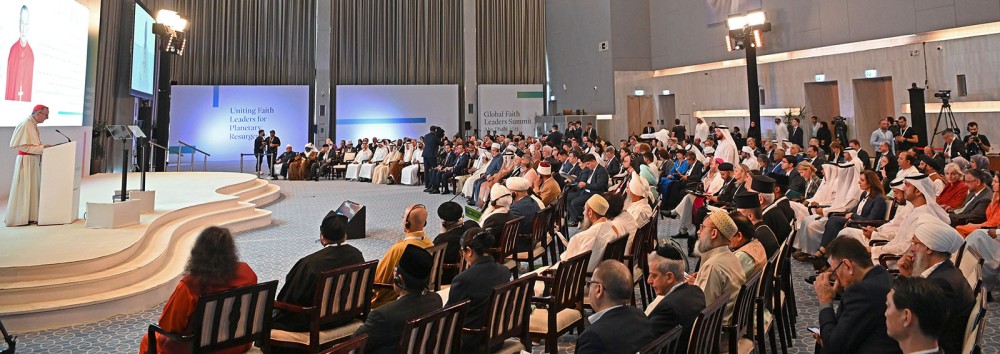Pope Francis to join other clergy at first 'Faith Pavilion' at climate summit

Cardinal Pietro Parolin, left, addresses the Global Faith Leaders Summit on November 7 in Abu Dhabi. (Photo courtesy of Muslim Council of Elders)
Pope Francis is set to speak at the inauguration of the first-ever “Faith Pavilion” during the upcoming 28th United Nations Climate Change Conference in the United Arab Emirates.
As political leaders from across the globe gather from November 30 to December 12 to assess how well they are addressing climate change, religious officials—including Francis, who is both a head of state and the leader of the worldwide Catholic Church—will have a new place of prominence.
The Faith Pavilion will be hosted by the UN Environmental Program, the Muslim Council of Elders, the Interfaith Center for Sustainable Development, the Episcopal Diocese of California, and dozens of other faith-based groups.
“There’s been a long-term effort among some of us who’ve been attending the COP from faith bodies to have a physical presence and to be more at the table,” said Marc Andrus, bishop of the Episcopal Diocese of California, in an interview.
“We believe that we have to have stronger voices together in order to meet the urgent need to combat climate change effects. The pavilion is really a physical embodiment of our commitment to really be an active sector in climate change work.”
Yonatan Neril, executive director of the Jerusalem-based Interfaith Center for Sustainable Development, expressed the leaders’ excitement about Francis’s participation in the inauguration of the pavilion, whose cost organizers declined to disclose.
He said the facility can accommodate as many as 100 people and will host 65 sessions about how major religious groups are working to reduce climate change. The religions represented are Islam, Christianity, Sikhism, Judaism, Hinduism, Baha’i, Buddhism, Indigenous religions, and Zoroastrianism.
“The Faith Pavilion will be right at the heart of COP28, located near the World Climate Action Summit and the area where the negotiations take place,” Neril said via email. “This demonstrates the significance of the interfaith movement in helping to tackle the climate emergency and provides a unique opportunity for faith-based engagement with key stakeholders, including political decision makers and negotiators.”
A number of other high-level faith leaders will also be speaking at the pavilion. Those leaders include Chief Rabbi Ephraim Mirvis of the United Kingdom; Bishop Thomas Schirrmacher, secretary general of the New York-based World Evangelical Alliance; and Sadhvi Bhagawati Saraswati, president of the India-based Divine Shakti Foundation.
Most of those speakers were signatories on a statement also signed by Ecumenical Patriarch Bartholomew I and representatives of Francis, Patriarch Kirill of Moscow, and Sheikh Ahmed Al-Tayeb, grand imam of Egypt’s Al-Azhar.
In the statement, they committed to guiding members of their organizations on environmental issues and changing consumption patterns to achieve the goals of the 2015 Paris Agreement seeking net-zero carbon emissions.
The California diocese has pioneered the use of a “carbon tracker” app, which helps users reduce their carbon footprint by reviewing how much they fly and drive, the source of heat in their homes and the kinds of food they choose to eat.
Andrus said his church presented the model during Climate Week in September in New York City as Muslims, Hindus, Roman Catholics, and others discussed how they can make tangible differences to respond to climate change.
At the Faith Pavilion, he said, representatives of different faiths will be able to speak and present examples of ways they are trying to replenish the Earth or reduce the negative effects they have on it—from Sikhs who have created “small sacred forests” in the Punjab region of India to Ethiopian Orthodox Christians who are “ringing their churches with forest” in the midst of a desert.
Andrus and Neril, like signatories on the statement, hope future UN climate summits will also include a pavilion focused on faith, as well as the continued presence of prominent religious leaders.
“Most of the world’s population, and many of the political negotiators at the COPs, affiliate with a religion,” stated Neril. “Yet for the first 27 UN climate conferences, senior religious figures have seldom shown up. At COP28 in Dubai, we have worked to significantly increase the presence of high-level religious leaders, and seek to do so at future COPs.” —Religion News Service





